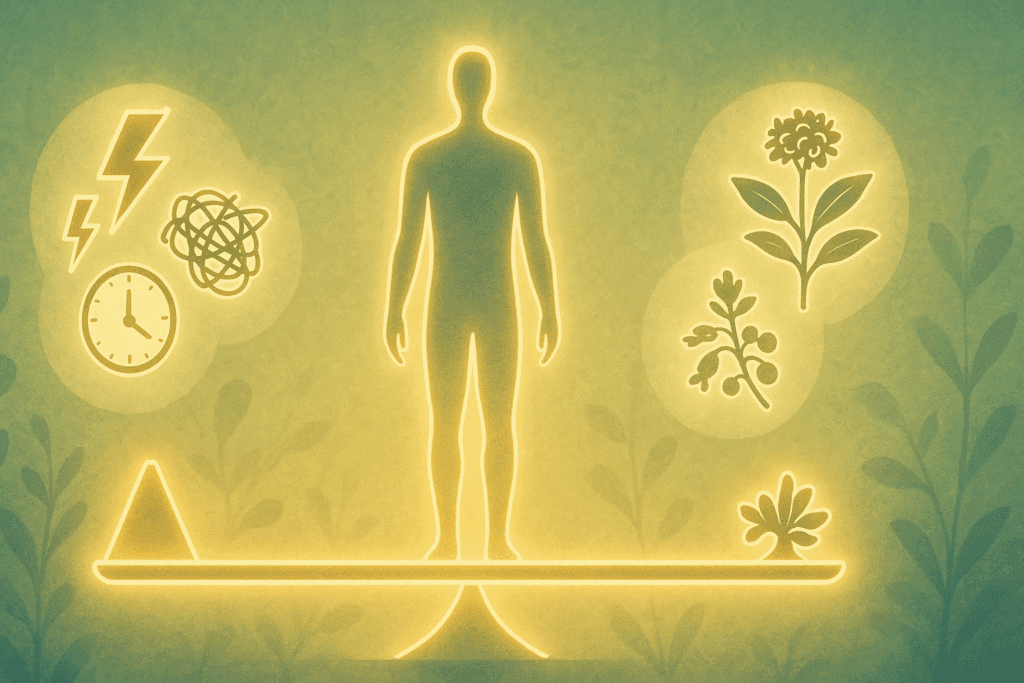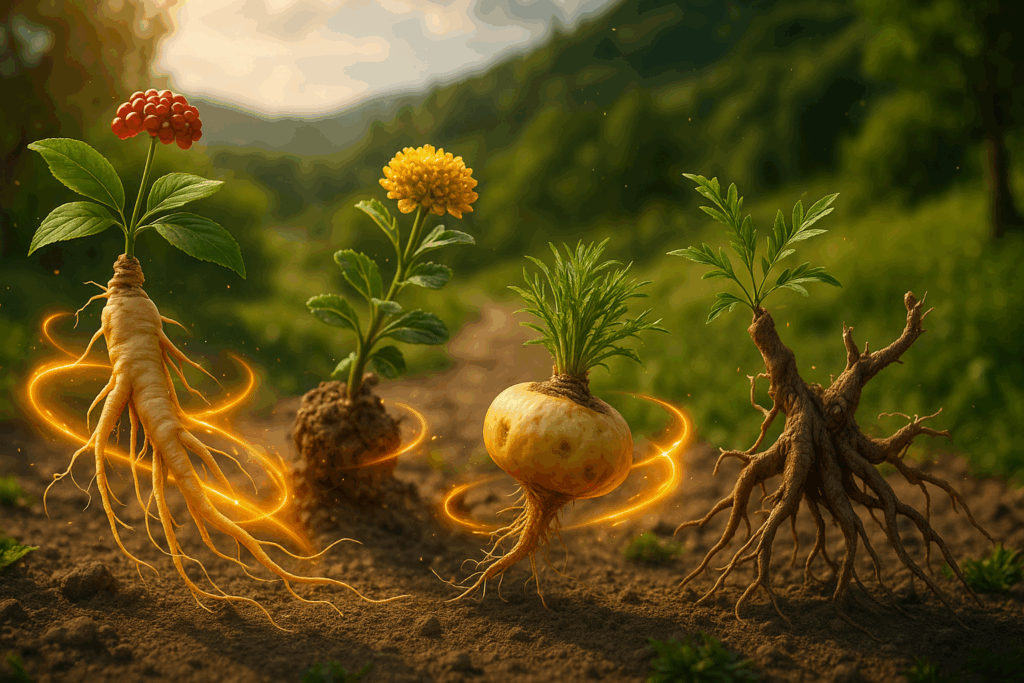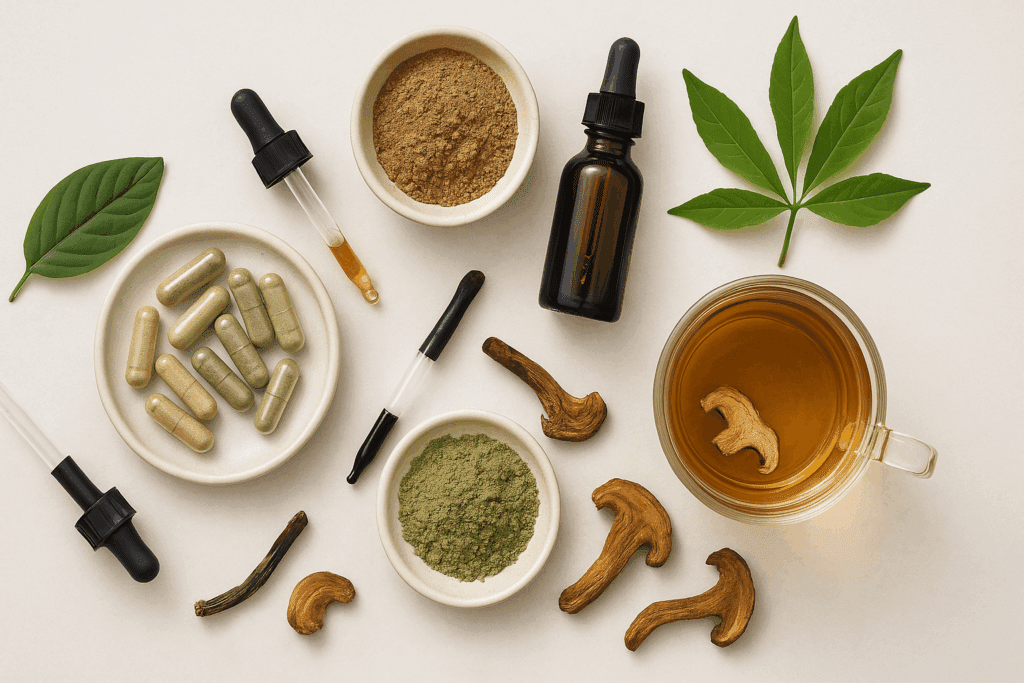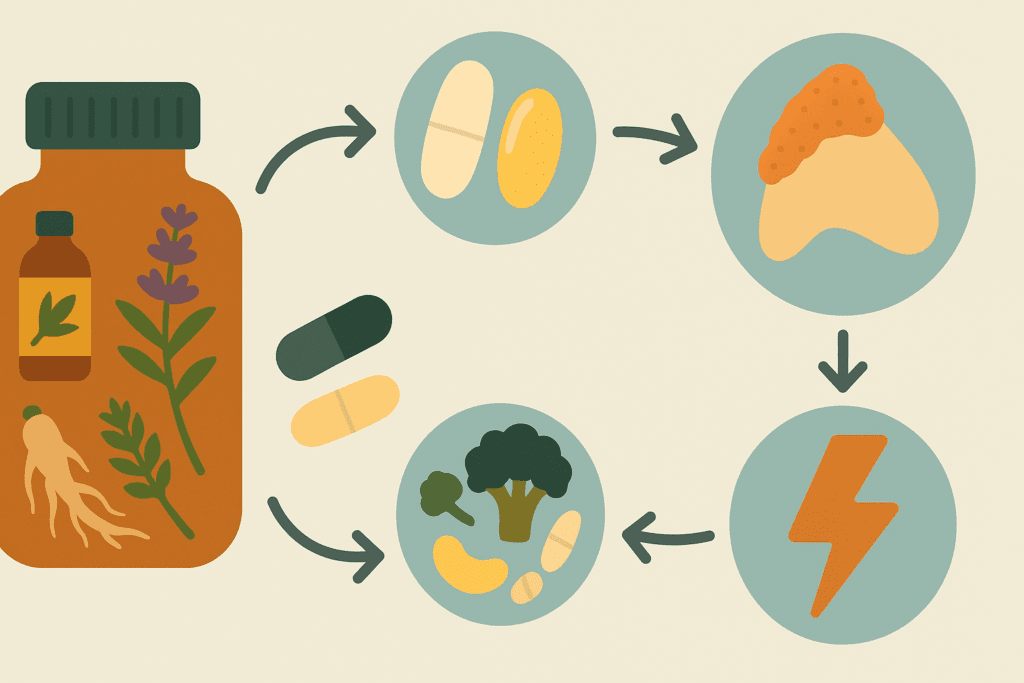In a world increasingly defined by high expectations, relentless responsibilities, and digital overstimulation, stress and fatigue have become chronic challenges. Whether due to workplace pressures, personal struggles, or environmental stressors, the toll on the mind and body is undeniable. As people seek healthier alternatives to pharmaceutical interventions, natural remedies like adaptogenic mushrooms and herbal supplements are emerging as potent allies. Among these, stamina herbal solutions are gaining recognition for their ability to combat fatigue, support energy, and enhance resilience under pressure. The integration of these natural agents offers a holistic approach to stress relief, combining ancient wisdom with modern wellness strategies.
You may also like: RYZE Mushroom Coffee Reviews: A Leading Adaptogen Infusion

Understanding Adaptogens: The Ancient Answer to Modern Stress
Adaptogens are a class of natural substances that help the body adapt to stress, maintain balance, and support homeostasis. Rooted in Ayurvedic and Traditional Chinese Medicine, these herbs and fungi have been used for centuries to bolster the body’s natural defenses. Unlike stimulants, which offer quick energy spikes followed by crashes, adaptogens work by regulating hormonal responses, particularly those linked to the adrenal system. This makes them ideal for managing long-term stress and supporting sustained energy levels without overburdening the nervous system.
One of the most compelling features of adaptogens is their dual-directional activity. For example, if the body is underactive, adaptogens can enhance performance; if overactive, they help to calm and stabilize. This intelligent regulation is especially valuable in addressing stress-related fatigue, a condition where the body oscillates between exhaustion and hyperactivity. Among the most well-known adaptogens are ashwagandha, Rhodiola rosea, and the adaptogenic mushrooms reishi, lion’s mane, and cordyceps. These natural agents support a calm mind, steady energy, and improved physical stamina—a trifecta of benefits that modern lifestyles desperately require.

The Science Behind Adaptogenic Mushrooms
Adaptogenic mushrooms, such as reishi, lion’s mane, chaga, and cordyceps, offer unique biochemical profiles that enhance their therapeutic potential. These fungi contain polysaccharides, beta-glucans, triterpenoids, and antioxidants that interact with the immune, endocrine, and nervous systems. Reishi, often referred to as the “mushroom of immortality,” has been studied for its ability to reduce anxiety, lower cortisol levels, and support immune function. Its calming effects make it particularly suitable for those facing chronic stress.
Lion’s mane, on the other hand, is celebrated for its neuroregenerative properties. It stimulates the production of nerve growth factor (NGF), a protein vital for the growth and maintenance of neurons. This makes it beneficial not only for cognitive performance but also for emotional resilience. Chaga and cordyceps round out the quartet with antioxidant and energy-boosting capabilities, respectively. Cordyceps, in particular, is favored among athletes and active individuals for its reputed benefits in oxygen utilization and mitochondrial function.
Scientific studies continue to explore the impact of these mushrooms on stress and fatigue. For instance, trials involving cordyceps have shown improvements in VO2 max, a measure of aerobic capacity, while reishi has been associated with improved sleep quality and decreased markers of anxiety. This body of research supports the inclusion of adaptogenic mushrooms in wellness routines aimed at achieving long-term vitality.

Stamina Herbal Solutions: Energizing the Mind and Body Naturally
Stamina herbal support encompasses a broad range of plant-based remedies designed to enhance energy, endurance, and recovery. Unlike synthetic energy boosters that often come with side effects, natural herbs for energy operate through more sustainable mechanisms. They modulate neurotransmitter activity, enhance oxygen delivery, and improve metabolic efficiency. The result is a smoother, more balanced energy curve that supports both mental focus and physical performance.
Ginseng, particularly Panax ginseng, is one of the best herbs for energy and stamina. It acts on the hypothalamic-pituitary-adrenal (HPA) axis to improve resistance to stress while enhancing alertness and physical endurance. Rhodiola rosea, another prominent stamina herbal, reduces fatigue by modulating serotonin and dopamine levels. Its adaptogenic nature means it supports both physical and emotional well-being, making it highly versatile.
Other energizing herbs include maca root, schisandra berry, and eleuthero (Siberian ginseng). These plants are often included in formulations that target chronic fatigue, burnout, and low vitality. As natural herbs for energy, they offer cumulative benefits over time, aligning well with the body’s inherent healing rhythms. For those struggling with long-term stress and exhaustion, stamina herbal remedies provide a reliable and evidence-informed option for regaining vigor and resilience.
Why Stress Relief and Energy Go Hand in Hand
The relationship between stress relief and energy is deeply intertwined. Chronic stress activates the sympathetic nervous system and the HPA axis, leading to elevated cortisol levels, disrupted sleep, and impaired mitochondrial function. Over time, this cascade of physiological changes results in exhaustion, poor concentration, and weakened immunity. Without adequate energy reserves, even minor stressors can feel overwhelming.
Conversely, restoring energy through natural herbs for vitality and endurance supports the body’s ability to manage stress more effectively. A nourished, energized body can better regulate cortisol, maintain emotional equilibrium, and sustain productivity. This is where energy enhancing herbs play a pivotal role. They not only replenish physical stamina but also buffer against the biochemical effects of stress. This bidirectional synergy forms the foundation of holistic wellness.
Adaptogenic mushrooms and stamina herbal remedies, when used together, amplify each other’s benefits. For instance, combining cordyceps with Rhodiola may improve both oxygen efficiency and neurotransmitter balance. This synergistic approach helps to sustain both mental and physical energy while enhancing stress resilience. As such, these natural agents represent a comprehensive strategy for achieving greater well-being in the face of life’s demands.

Exploring the Best Herbal Supplements for Energy and Resilience
When considering the best herbal supplements for energy, it’s important to recognize that not all formulations are created equal. Quality, sourcing, and bioavailability all influence the efficacy of a given product. Reputable brands prioritize organic sourcing, standardized extracts, and third-party testing to ensure safety and potency. Consumers should look for supplements that combine multiple herbs known for their energizing properties—such as ginseng, Rhodiola, and eleuthero—with adaptogenic mushrooms like cordyceps or lion’s mane.
In addition to individual herbs, proprietary blends and adaptogenic formulas are increasingly popular. These formulations are designed to offer a balanced spectrum of effects, targeting different pathways of energy metabolism and stress modulation. For example, a supplement may include ashwagandha for adrenal support, maca for hormonal balance, and Schisandra for liver detoxification. These combinations provide a multi-layered approach to health, catering to the complex interplay between stress, fatigue, and vitality.
It’s also worth noting the role of delivery mechanisms in supplement efficacy. Liquid extracts, tinctures, and liposomal formulations often provide superior absorption compared to capsules and powders. Timed-release capsules can be useful for individuals seeking sustained energy throughout the day. Understanding these nuances helps consumers make informed choices and maximize the benefits of their supplements.
Integrating Herbs for Endurance into a Holistic Lifestyle
Herbs for endurance are most effective when integrated into a comprehensive lifestyle strategy. Nutrition, sleep, exercise, and stress management all influence how well the body responds to herbal interventions. For example, individuals who prioritize whole-food nutrition, hydration, and restorative sleep are likely to experience more pronounced benefits from energy enhancing herbs.
Exercise, especially aerobic activity, complements the effects of herbs for energy boost by improving cardiovascular health, increasing mitochondrial density, and enhancing mood. Practices such as yoga and meditation further augment this synergy by promoting parasympathetic activation and emotional regulation. When combined with regular intake of stamina herbal supplements, these habits form a powerful foundation for sustained well-being.
Moreover, consistency is key. Unlike pharmaceuticals that may produce immediate effects, herbs often require several weeks of regular use to exert their full impact. This gradual build-up aligns with the body’s natural healing processes, offering deeper, more lasting results. For those committed to long-term vitality, patience and routine are essential.

Addressing Exhaustion with Targeted Herbal Strategies
Exhaustion is more than just fatigue; it reflects a depletion of physical, emotional, and mental reserves. Herbs for exhaustion aim to rebuild these reserves by supporting the systems most affected by chronic stress. Adrenal-supportive herbs like ashwagandha, licorice root, and holy basil work by regulating cortisol levels and replenishing hormonal balance. These plants are particularly helpful for individuals experiencing burnout, hormonal imbalances, or post-illness fatigue.
In addition to adrenal support, mitochondrial health is a critical focus in addressing exhaustion. Cordyceps, Rhodiola, and CoQ10-containing herbs enhance cellular energy production, restoring vitality at the most fundamental level. These herbs for energy and stamina go beyond superficial stimulation to target the root causes of fatigue. For those with demanding careers, caregiving responsibilities, or chronic health conditions, such targeted herbal strategies offer a lifeline back to vitality.
It is important to tailor herbal approaches to individual needs. Consulting with a qualified herbalist or integrative healthcare provider can ensure the selection of appropriate herbs and dosages. Personalized regimens consider factors such as constitution, lifestyle, and existing medical conditions, ensuring safety and maximizing results.
The Role of Natural Herbs for Energy in Cognitive Performance
While much focus is placed on physical stamina, cognitive performance is equally critical in today’s mentally demanding world. Natural herbs for energy often exert nootropic effects, enhancing memory, attention, and mental clarity. Lion’s mane, as previously mentioned, supports neurogenesis and brain plasticity, making it a valuable ally for cognitive enhancement. Bacopa monnieri and ginkgo biloba are additional herbs with robust evidence supporting their use in cognitive support.
These herbs for vitality work through mechanisms such as increased cerebral blood flow, modulation of neurotransmitters, and antioxidant protection. For students, professionals, and aging populations, they offer a non-pharmaceutical option to enhance brain function without the risks associated with synthetic nootropics. The combination of physical energy and mental clarity contributes to holistic productivity and emotional well-being.
Long-term use of these herbs may also confer neuroprotective benefits. For instance, ongoing studies suggest that lion’s mane may reduce the risk of neurodegenerative conditions such as Alzheimer’s disease. This dual role of enhancing current function while safeguarding future health makes natural herbs for energy a wise investment in lifelong cognitive vitality.

Stamina Herbal Synergy with Nutrition and Supplementation
Herbs do not operate in isolation; their efficacy is profoundly influenced by nutritional status and other supplements. For example, adaptogenic herbs often work better when paired with B-complex vitamins, magnesium, and omega-3 fatty acids. These nutrients support adrenal function, neurotransmitter synthesis, and cell membrane integrity, enhancing the body’s response to herbs.
A diet rich in phytonutrients, healthy fats, and lean proteins complements the action of stamina herbal formulations. Foods such as dark leafy greens, fatty fish, berries, and fermented vegetables provide the antioxidant and anti-inflammatory support needed to counteract the effects of stress. Avoiding sugar, caffeine, and processed foods can further enhance the body’s ability to benefit from herbs for energy boost.
It is also beneficial to rotate herbs periodically to prevent tolerance and maintain efficacy. This strategy, known as herbal cycling, allows the body to reset and ensures continued responsiveness. For example, one might use Rhodiola and cordyceps for several weeks, followed by a rotation to ashwagandha and maca. Such intelligent supplementation maximizes results and prevents stagnation.
A Closer Look at Herbs to Increase Energy in Special Populations
Different populations have unique needs when it comes to herbs to increase energy. For athletes, cordyceps, maca, and ginseng offer performance-enhancing benefits that support training, recovery, and endurance. These herbs enhance oxygen utilization, muscle function, and mental focus, making them ideal for competitive and recreational athletes alike.
For aging adults, herbs for vitality support longevity and functional independence. Ashwagandha, ginkgo, and lion’s mane are particularly beneficial for preserving cognitive function, maintaining hormonal balance, and reducing inflammation. In postmenopausal women, herbs like maca and shatavari can also support hormonal equilibrium and vitality.
Busy professionals and students benefit from herbs that support both focus and stress reduction. Rhodiola, bacopa, and eleuthero are particularly well-suited for this demographic, offering cognitive support alongside stress resilience. Pregnant and breastfeeding women, however, should consult healthcare providers before using herbal supplements, as not all herbs are safe during these life stages.
Stamina Herbal Support in Chronic Illness Recovery
For individuals recovering from chronic illness, stamina herbal interventions can play a crucial role in restoring vitality. Chronic conditions such as Lyme disease, fibromyalgia, and long COVID often involve profound fatigue and systemic dysfunction. Adaptogenic herbs support the HPA axis, modulate inflammation, and restore mitochondrial function, offering multi-dimensional support.
Ashwagandha, cordyceps, and Schisandra are commonly used in post-illness recovery protocols. These herbs not only improve energy but also support immune regulation, mental clarity, and emotional stability. When combined with nutritional therapies, physical therapy, and mindfulness practices, they help create a comprehensive recovery plan.
Recovery is a gradual process, and stamina herbal support offers a gentle yet effective path to renewal. Regular monitoring, adjustment of dosages, and lifestyle modifications are essential to achieving sustainable results. This approach aligns with functional medicine principles, which emphasize individualized care and root-cause resolution.
Frequently Asked Questions (FAQ): Adaptogens, Mushrooms, and Stamina Herbal Energy Support
What are some underrated energizing herbs that support both physical and emotional endurance?
While ginseng and Rhodiola are frequently highlighted, there are lesser-known energizing herbs that offer powerful effects with a gentler profile. Jiaogulan, sometimes called “southern ginseng,” is a climbing vine traditionally used in Chinese medicine that improves cardiovascular efficiency and resilience to stress. Shilajit, a mineral-rich substance sourced from mountainous regions, enhances mitochondrial function and nutrient absorption, making it one of the most effective yet underappreciated herbs for endurance and vitality. Tulsi, or holy basil, promotes clarity and calm while supporting adrenal balance, which makes it excellent for those experiencing stress-related fatigue. These herbs are especially valuable in multi-herbal blends where their subtle effects can compound synergistically to enhance overall energy and mood regulation.
How can stamina herbal blends help during transitional life phases like menopause or andropause?
Stamina herbal formulations can play a crucial role in maintaining balance and vigor during hormonal transitions such as menopause or andropause. These phases are often marked by drops in testosterone, estrogen, and cortisol regulation, which directly impact energy levels, sleep quality, and emotional stability. Herbs for energy such as maca, ashwagandha, and schisandra help ease the hormonal rollercoaster while supporting libido and cognitive clarity. Adaptogenic mushrooms like reishi and lion’s mane can further reduce stress and bolster neuroendocrine function, helping individuals navigate these changes with greater ease. Integrating these energy enhancing herbs into daily routines—especially alongside hormone-friendly nutrients like magnesium and B6—can offer targeted relief and foster long-term vitality.
Can herbs for exhaustion be used to improve post-exercise recovery?
Yes, certain herbs for exhaustion are highly effective for promoting faster and more complete recovery after intense physical exertion. Cordyceps is well-researched for its role in enhancing oxygen uptake and ATP production, making it ideal for post-workout energy replenishment. Rhodiola also reduces lactic acid buildup, lessening muscle fatigue and soreness. These natural herbs for energy can be paired with anti-inflammatory botanicals like turmeric and boswellia for muscular recovery and joint support. Many athletes now incorporate adaptogenic blends that include stamina herbal extracts specifically for post-training recuperation, often reporting better sleep, reduced muscle breakdown, and improved subsequent performance. Recovery-focused herb protocols can serve both elite athletes and recreational fitness enthusiasts aiming to enhance physical performance sustainably.
What are the best herbal supplements for energy for people with sensitive digestive systems?
Individuals with sensitive digestive systems must be cautious with herbal choices to avoid gastrointestinal irritation. Fortunately, many of the best herbal supplements for energy are available in forms that support gentle absorption and minimal discomfort. Liquid extracts or glycerites tend to be easier on digestion than raw powders or capsules. Eleuthero, maca, and ashwagandha are well-tolerated when used in small, divided doses throughout the day. Energizing herbs like lion’s mane and cordyceps can be taken as teas or broths, further easing digestive load while still supporting stamina and clarity. It’s advisable to begin with a single herb before combining multiple stamina herbal ingredients, allowing the body to acclimate and minimizing potential sensitivities.
How do herbs for fatigue support individuals with long-term cognitive strain, such as students or knowledge workers?
Herbs for fatigue offer a multidimensional advantage for those experiencing cognitive burnout due to prolonged concentration and screen time. Unlike caffeine, which overstimulates and often leads to crashes, herbs for energy boost mental clarity and alertness without taxing the nervous system. Lion’s mane mushroom, for instance, supports neurogenesis and synaptic plasticity, improving the brain’s ability to retain and process information. Bacopa monnieri enhances memory recall while simultaneously lowering cortisol levels, making it a top choice for exam periods or deadline-heavy work environments. When used consistently, these natural herbs for energy also foster greater emotional resilience, allowing users to handle pressure more calmly and recover from mental exhaustion more quickly.
What are practical ways to cycle stamina herbal supplements to avoid tolerance?
Cycling stamina herbal supplements involves periodically rotating different herbs or taking intentional breaks to maintain sensitivity and effectiveness. A common approach is the “3-weeks-on, 1-week-off” method, which gives the body time to recalibrate. Users might take a blend containing Rhodiola and eleuthero for three weeks, pause for a week, and then switch to a combination like ashwagandha and maca. This rotation helps prevent receptor desensitization and supports continued adrenal balance. For long-term use, it’s beneficial to keep a journal of perceived effects, noting which herbs yield the best outcomes under specific life circumstances. Combining herbs for energy boost with other self-care strategies like breathwork and restorative sleep can further reduce the need for escalating doses over time.
Are there any cultural or regional differences in how herbs for vitality are used around the world?
Absolutely. Cultural contexts significantly influence the selection and application of herbs for vitality across the globe. In South America, yerba mate and guarana are prized for their stimulating effects and social consumption traditions. In India, ayurvedic practices emphasize ashwagandha and shatavari not only for stamina but also spiritual alignment. In Siberia and parts of Eastern Europe, Rhodiola and eleuthero have been staples among hunters and laborers enduring harsh climates, celebrated for enhancing cold resistance and mental stamina. These regional practices offer valuable insight into how energizing herbs are not merely used as health products but as cultural tools for adaptation and resilience. Integrating traditional wisdom with contemporary research can reveal new applications and combinations that modern users may otherwise overlook.
How can energy enhancing herbs help shift workers manage circadian disruption?
Shift workers often face circadian rhythm misalignment, which impacts hormone production, digestion, mood, and energy regulation. Energy enhancing herbs can help recalibrate internal rhythms while minimizing the adverse effects of irregular sleep-wake cycles. Adaptogens like Rhodiola and cordyceps promote alertness during active hours and improve recovery during rest phases, even if those periods occur during daylight. Herbs for endurance like Schisandra also support liver detoxification, which is crucial for those eating or sleeping at odd hours. Coupled with strategies such as blue light blocking, consistent meal timing, and supplemental melatonin, these natural herbs for energy provide a non-pharmaceutical way to support productivity and long-term health in unconventional work environments.
What are emerging trends in the formulation of the best herbs for energy?
The latest trend in formulating the best herbs for energy involves personalization and precision nutrition. Companies are developing AI-driven quizzes and biometric tracking tools that match individuals with herbal profiles tailored to their stress patterns, hormone levels, and daily rhythms. There is also growing interest in pairing herbs for fatigue with nootropic compounds, such as L-theanine or citicoline, to create hybrid supplements that enhance both mental and physical stamina. Some new formulations utilize time-release delivery systems or liposomal encapsulation to optimize absorption and effect duration. Additionally, the market is seeing a rise in functional beverages and adaptogenic snacks that deliver herbs for energy boost in more convenient and enjoyable formats. These innovations make it easier for users to incorporate potent herbal remedies into busy, modern lifestyles without sacrificing effectiveness.
Stamina Herbal Support: Can It Enhance Long-Term Immune Function?
Beyond short-term energy, stamina herbal strategies are increasingly studied for their impact on immunity. Chronic stress and fatigue often weaken immune surveillance, leaving individuals vulnerable to infections and inflammation. Herbs such as reishi and astragalus not only support energy metabolism but also regulate cytokine activity and improve natural killer (NK) cell function. Over time, this dual benefit helps to fortify the body against seasonal illnesses and supports recovery from chronic immune challenges. For those prone to frequent colds, flus, or allergies, integrating stamina herbal products into a broader wellness routine may provide both energizing and immunomodulating effects, promoting long-term vitality from the inside out.
Can Stamina Herbal Formulas Support Mental Health in High-Pressure Careers?
Yes, stamina herbal blends can be valuable tools for emotional and psychological resilience in high-pressure professions such as law, healthcare, finance, and entrepreneurship. These environments demand prolonged focus, emotional agility, and stress tolerance—areas where herbs for energy and vitality excel. Adaptogens like ashwagandha and Rhodiola help modulate cortisol, reducing anxiety and emotional reactivity without causing sedation. Cordyceps and Schisandra promote consistent energy output, enabling professionals to perform at high levels without experiencing burnout. Importantly, many users report that consistent use of stamina herbal formulas contributes to a deeper sense of groundedness and self-regulation, helping them remain focused, calm, and mentally agile amidst relentless demands. When paired with mindfulness practices and proper sleep hygiene, the impact on mental health can be both protective and transformative.
Conclusion: Embracing a Holistic Path to Energy and Emotional Resilience
As the modern world continues to exert unprecedented pressure on our minds and bodies, the need for sustainable, natural solutions becomes ever more urgent. Adaptogenic mushrooms and stamina herbal support represent a compelling synthesis of ancient wisdom and contemporary science. They address not only the symptoms of stress and fatigue but the underlying imbalances that give rise to them.
By incorporating the best herbal supplements for energy and combining them with energizing herbs, individuals can reclaim their vitality without compromising their health. These herbs for endurance, exhaustion, and vitality provide a foundation for long-term resilience, helping people to meet life’s challenges with strength and clarity. Whether you’re seeking to overcome burnout, improve performance, or simply feel more alive, the strategic use of herbs for energy boost and natural herbs for energy offers a path forward rooted in balance and harmony.
Ultimately, vitality is not a fleeting state but a sustained condition cultivated through daily choices. With the intelligent integration of adaptogenic mushrooms and stamina herbal remedies into a mindful lifestyle, we can unlock the energy, focus, and calm we need to thrive—not just survive.
Further Reading:
Herbs for Energy: Ditch the Caffeine with These 7 Herbs
